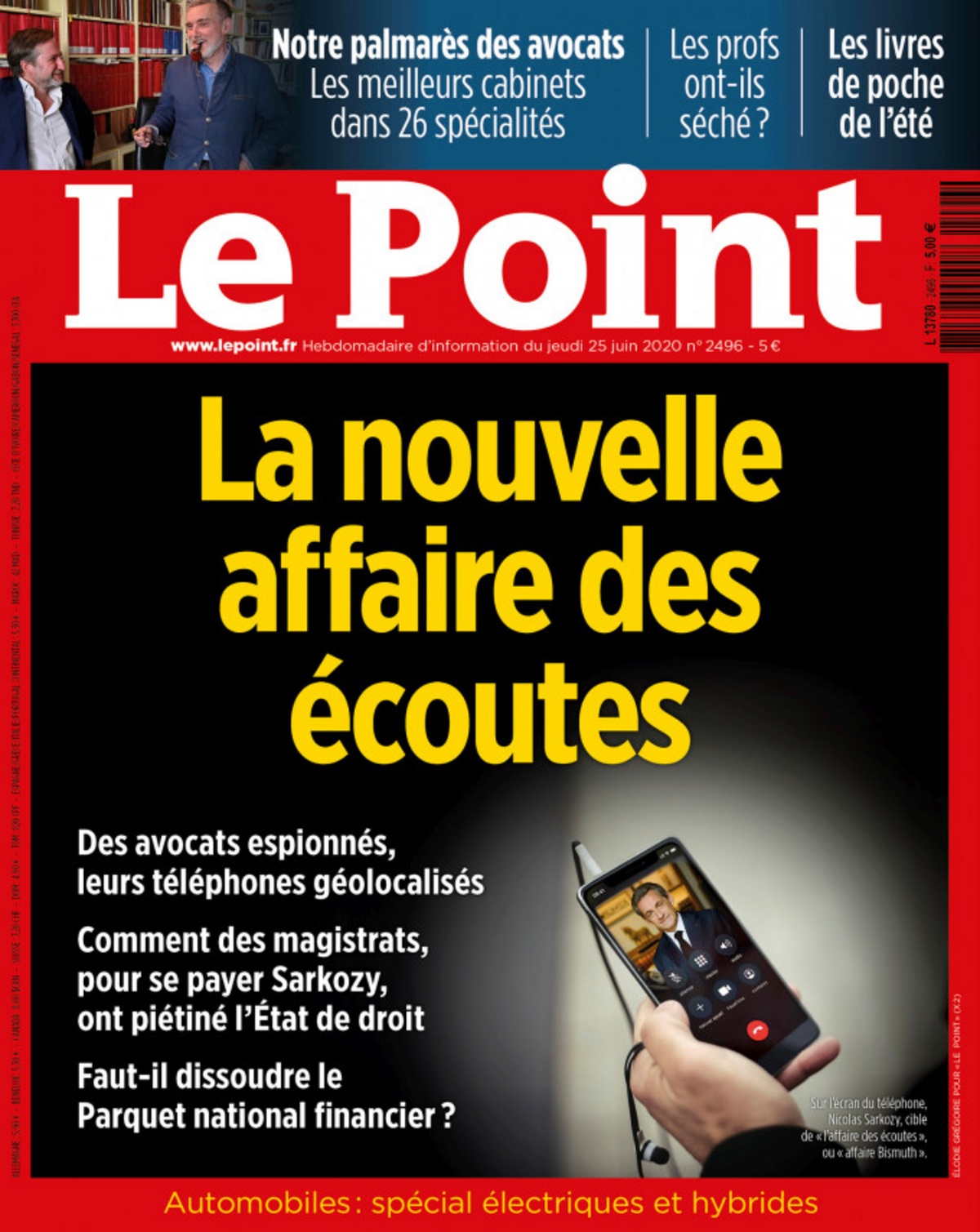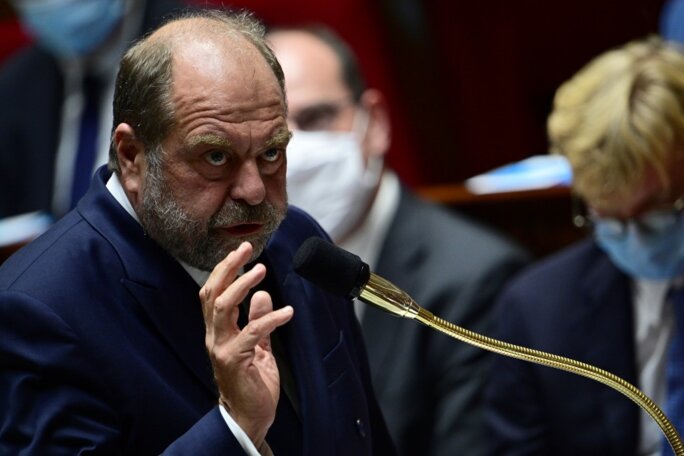Some in Nicolas Sarkozy's defence team and in his inner circle thought that it would signal the end of France's financial crimes prosecution unit, the Parquet National Financier (PNF).
Yet a report into the PNF's hunt for the legal 'mole' who tipped off the former president and his lawyer Thierry Herzog that their phones were being tapped has just cleared its prosecutors of any wrongdoing in the affair.

Enlargement : Illustration 1

The controversy started in June this year when Le Point magazine carried revelations about the PNF and its probe into Nicolas Sarkozy and his lawyer Thierry Herzog into what became known as the 'Bismuth' affair. The magazine saidthat alongside the main investigation, the prosecutors had spent two weeks in 2014 going through the phone records of prominent Parisian lawyers. The PNF investigators hoped to discover the identity of the mole inside the legal system who had illegally told the former president that he and Herzog were, discreetly but quite legally, being eavesdropped in the 'Bismuth' affair.
The magazine claimed that the affair threatened to “trample over the rule of law” and there was a high-profile media campaign orchestrated by some of the most influential Parisian barristers, including Éric Dupond-Moretti who was then a leading defence lawyer. The controversy forced the justice minister at the time, Nicole Belloubet, to instruct the ministry's inspectorate, the Inspection Générale de la Justice, to investigate the matter.
Éric Dupond-Moretti, who announced he was suing the PNF for breach of privacy and professional confidentiality, publicly described the magistrates and prosecutors as “nutters” and a “clique of judges who feel free to do anything” and who used “the methods of spooks”. He withdrew his legal action when he was named justice minister in July.
The pro-Sarkozy Member of Parliament Éric Ciotti, meanwhile, said he would be tabling a Parliamentary bill to abolish the PNF.
And Nicolas Sarkozy himself criticised what he called an “unbelievable accumulation of failings and dysfunction”, adding: “I have just one request: respect for the rule of law.”
Now, after two months of investigation and after questioning dozens of people – officials at the PNF, detectives at the police fraud squad the Office Central de Lutte contre la Corruption et les Infractions Financières et Fiscales (OCLCIFF) and lawyers who represent the legal profession - the Inspection Générale de la Justice has delivered its verdict in a 129-page report. It would be an understatement to say that it will disappoint Sarkozy supporters.
In summary, the inspectors do not just conclude that the PNF hunt for the mole was perfectly legal; they also state that prosecutors protected the privacy and professional confidentiality of the lawyers involved.

Enlargement : Illustration 2

The inspectors write: “The writing of the statements about the receipt and use of the data collected attests to the care of the investigators not to inordinately expose the privacy or professional confidentiality of those who owned the [phone] lines. So only information that was likely to inform the investigations was transcribed using names.” In the report's introduction the inspectors also speak of “clear and factual” official statements, far-removed from the “spook” tactics of which the PNF investigators had been accused.
The Ministry of Justice inspectors point out that “the provisions in the criminal procedure code relating to search [requests] sent to telephone operators do not provide protection for the legal profession”.
The report also states that the police warrants provided by the PNF had a precise goal: “The aim being pursued is to find if someone subject to professional confidentiality has, knowingly or unwittingly, sent confidential information to people who are the object of criminal proceedings that is liable to harm the investigation.”
“Several people [we spoke to] wanted to remind us that the existence of a mole in proximity to or even in the heart of the legal body had haunted the PNF for months, fuelling the long-standing desire to identify them and to stop them from causing harm again.”
This concern can only have been increased when in July 2014 a senior judge at the top appeal court the Cour de Cassation, Gilbert Azibert, was placed under formal investigation, suspected of illegally informing Nicolas Sarkozy and Thierry Herzog about ongoing legal proceedings. Sarkozy and Herzog, who were placed under formal investigation for “corruption” in the same case – the so-called 'Bismuth' affair – will stand trial in Paris in November.
The prosecutors in that high-profile court case will be the PNF. That fact did not, however, prevent the newly-appointed justice minister Éric Dupond-Moretti - who is in ultimate charge of all prosecutors in France including the PNF – from spending part of his holidays this summer on the Côte d’Azur with the defendant and old friend Thierry Herzog. When questioned about this by Mediapart the justice minister dismissed any suggestion of a conflict of interests, claiming the right to privacy over his holidays. These same holidays were, incidentally, reported in Paris Match magazine.

Enlargement : Illustration 3

The Ministry of Justice's inspectors did criticise the PNF, even if this was for less fundamental points than the legality of their investigation and their respect for privacy and professional confidentiality. The prosecutors are implicitly criticised for having dragged out the hunt for the Sarkozy-supporting mole, even though the investigation went dormant after an initially active start. The mole was never formally identified.
In fact the investigation, which began in 2014, was still open five years later. In August 2019 a senior prosecutor from Paris, who was in temporary charge of the PNF after the departure of its former head Éliane Houlette, called for the investigations to restart “having regard for the seriousness of the facts”. But this again led nowhere, and the investigation was formally ended in December 2019. In their report the inspectors write about a “lack of rigour in the conduct of the proceedings” in relation to the “lack of care over the investigation's duration”.
The report's authors are also astonished that Houlette, who was the only person who refused to speak to the investigators, made little use of the potential chain of information with prosecutors in Paris in the PNF mole hunt. “According to several people questioned, the [prosecutor's] caution over passing information up the chain could have been explained by her fear that the reports might be divulged, even by accident,” says the report. It nonetheless notes that “it was essential that the information from the [Paris prosecution authorities] be used, employing methods adapted to the sensitivity of the main affair [the 'Bismuth' case] and the investigation [into the mole], concerning a suspicion of leaks inside the judicial world”.
The Ministry of Justice's inspectors also had more institutional criticism, pointing to the chronic disorganisation inside the PNF in the period when Houlette was in charge. They state: “At the time of its investigations into the [PNF's] handling of this investigation, the [inspectorate] noted the need for changes in the PNF's working environment. [The inspectorate] also thinks it is necessary to develop its governance and organisation, to formalise its operational rules better and to reinforce internal control procedures.”
The new chief prosecutor in charge of the PNF, Jean-François Bohnert, has already informed the inspectorate that he is aware of the need to “take into account these issues concerning change, to give a new impetus to a prosecution [unit] that, while it has acquired institutional legitimacy, is still new”.
In general the legal world has reacted with relief to the inspectorate's report. “Overall, it's a pleasant surprise because I feared the PNF would be killed off,” said one judge who specialises in financial affairs. “And what's more, for once the management hasn't been spared. We have to be cautious now, in view of the press statement from the minster, who asked the Judicial Services Directorate [at the Ministry] to draw the necessary conclusions from the report.”
Céline Parisot, president of the Union Syndicale des Magistrats (USM), the body which represents the majority of judges and prosecutors, said the report had been more nuanced because the inspectorate knew that it was going to be made public. She continued: “It reveals some dysfunctions which are the same as in other prosecution services – some minor organisational problems, some minor data issues – but which become worrying in a sensitive case. However, the report says that it was indeed legitimate to investigate to find the 'mole' who was informing a former president of the Republic and his lawyer about ongoing legal proceedings. The inspectorate does not say anything about the effectiveness of the acts carried out, and stays within its area of competence.”
As an aside, Céline Parisot says she is surprised that the probe into the mole was formally dropped on the grounds that no offence had been identified, when “there was indeed an offence, whose author hasn't been identified”. She fears that this could have consequences in the way the Bismuth trial proceeds.
Katia Dubreuil, president of another representative body for the judiciary, the Syndicat de la Magistrature (SM), said the report confirmed what they had already stated in writing to the justice minister and had argued before the Conseil d'État, the country's top administrative body. “The inspectorate cannot pronounce on the proportionality of the acts carried out by the PNF,” she said. This was because the inspectorate is an administrative body under the authority of the minister. “The mission statement given to the inspectorate undermined the principle of the separation of powers,” she said.
“The report is a bit schizophrenic, it cites some problems which it can't answer. You get the feeling that the inspectorate didn't quite know which way to go,” continued Katia Dubreuil. “That aside, on the organisational issue highlighted in the report, it's true that there can be adjustments that need making for a very new institution such as the PNF. The fact remains that it is shocking that this report should have been sent to the minister when he was a party to the proceedings in his capacity as a lawyer; he has a conflict of interests.”
------------------------------------------------------------------------------------
- The French version of this article can be found here.
English version by Michael Streeter


